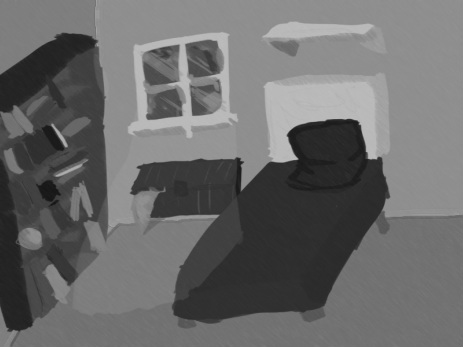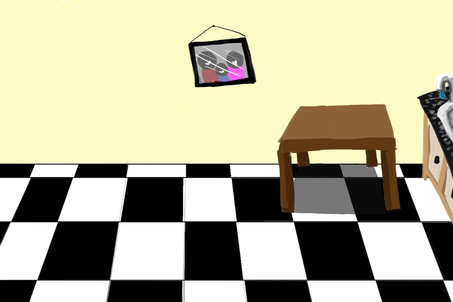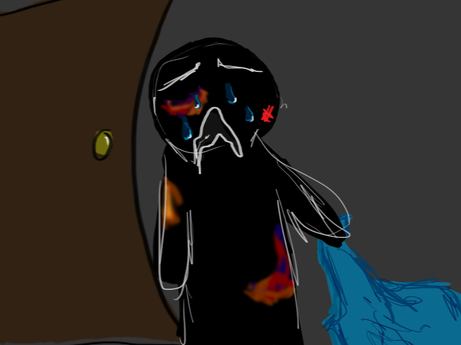"Sentiment" is a project for a Game Design course, programmed in a web-based game-engine called Galatea (thegamecommons.com). The story was designed by me and Carl Chen. I designed and implemented the music and sound effects, Carl and I did the programming for the actual game functions and movement, and CJ Logan and I created the art (all art on this page is by me, in addition to other scenes and objects in the game).
Play the beta here: http://thegamecommons.com/node/4184 (it may take a bit to load)
Play the beta here: http://thegamecommons.com/node/4184 (it may take a bit to load)
 The beginning bedroom level
The beginning bedroom level
You are an adult visiting your parents and you decide to rummage through old childhood objects in your old room. It is monotone, gloomy, dusty, neglected- forgotten. You feel depressed, as if your life never really mattered and you feel like you have experienced nothing but pain. You interact with items in your room to trigger childhood memories: your beloved teddy, your old safety blanket, a baseball from when you used to play with your Dad, and a birthday card. Two of these objects will trigger happy memories and the others will lead to bad memories. You choose to interact with two objects, not knowing which objects lead to what kind of memories. Depending on which two you chose, it affects your emotional state and how you view the world in the end. Two bad memories lead to suicide, two good memories lead to a happy outcome, and one good/one bad has a hopeful ending.
You explore the room using the arrow keys to find objects and unfold the memories. During the memories, there are mini-tasks or minigame-like gameplay to accomplish small tasks in the memory.
You explore the room using the arrow keys to find objects and unfold the memories. During the memories, there are mini-tasks or minigame-like gameplay to accomplish small tasks in the memory.
 The kitchen level background
The kitchen level background
For example, In the teddy bear memory, you have to go to bed but you don't have your teddy bear and you need it to fall asleep, so you go look for your teddy. You find the teddy bear in the other room on a table which you can not reach. You have to figure out a way to reach the teddy bear. After you successfully retrieve the teddy bear, you exclaim how much you love your teddy bear and the scene will fade back to your childhood room. In the safety blanket memory, you bring your blanket to school to ward off the bullies, because with your blankey you can do anything! However, the bullies make fun of you and beat you up. You then return back to your present-day childhood room. This leads to a hopeful ending- that maybe your life matters in some way, and perhaps you can find your own happiness.
 The main character as a child, after being beaten up by bullies
The main character as a child, after being beaten up by bullies
Music and sound plays a huge part in this game because the music reflects the player's emotional state as well as contributes to monologues or scene atmosphere and mood. Some of the sound effects I recorded myself with my Blue Yeti, such as when the player grabs the teddy bear, the muffled TV sounds, all the voice acting, and the punching. For some of the larger-scale sounds such as the parking lot, soccer field, and school hallway, I had wanted to record myself but I didn't have a means to do it.
For further development of this game, I want to add in more objects to interact with so there are more endings and as a result, the game has a replay value. I want to add in more objects in the memories for the player to interact with so the story of the protagonist's childhood is more developed. Also, I want to implement a mechanism where once a memory is accessed, the player can decide whether to go back into the memory and try to change the outcome. The player would go back into the memory, with some things slightly different, and they have a choice to change how they act. However, no matter how they act, the ending will always be the same- to parallel how you can't truly change the past. Despite not being able to change the events of the past, you can change how you feel or reflect upon the memory, so you could make a bad memory, a happy memory, or vice versa.
With the current game version, there are some glitches such as the walking animation and how the chair-sound plays. Another issue that hasn't been resolved yet is when the player returns from a memory level, a dialogue is supposed to appear to reflect how the character feels about the memory. By not having this implemented, I believe it greatly takes way from the emotional experience of the character. The dialogues after the memory are supposed to be;
After Teddy:
Oh man, ha, I forgot how much I loved this teddy. Mom gave it to me for Christmas one year... I thought it would always keep me safe from the monsters at night. But I guess the real monster was Dad.
After Blanket:
I was such a weak kid...and that stupid blanket...pft pretending I was Superman. I haven’t changed at all since then...I’m still a weak, coward...but...at least I tried to be a hero I guess.
With more memories to access, objects to interact with, and after-memory reflection, the character's emotional journey would be more complete and coherent. I plan to further work on this game by myself.
With the current game version, there are some glitches such as the walking animation and how the chair-sound plays. Another issue that hasn't been resolved yet is when the player returns from a memory level, a dialogue is supposed to appear to reflect how the character feels about the memory. By not having this implemented, I believe it greatly takes way from the emotional experience of the character. The dialogues after the memory are supposed to be;
After Teddy:
Oh man, ha, I forgot how much I loved this teddy. Mom gave it to me for Christmas one year... I thought it would always keep me safe from the monsters at night. But I guess the real monster was Dad.
After Blanket:
I was such a weak kid...and that stupid blanket...pft pretending I was Superman. I haven’t changed at all since then...I’m still a weak, coward...but...at least I tried to be a hero I guess.
With more memories to access, objects to interact with, and after-memory reflection, the character's emotional journey would be more complete and coherent. I plan to further work on this game by myself.